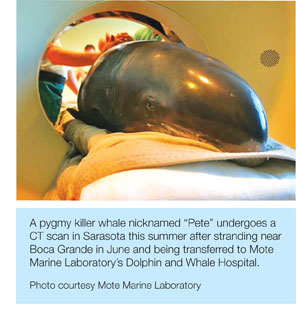 |
||||||||
 Stranded Pygmy Killer Whale Dies,
Stranded Pygmy Killer Whale Dies,
Another Continues Recovery
By Mary Kelley Hoppe
One of two pygmy killer whales brought to Mote Marine Laboratory’s Dolphin and Whale Hospital on June 16 after stranding near Boca Grande died Sept. 3rd, while another continues to improve but remains in critical condition. The animal, nicknamed “Dallas,” had been treated for a number of conditions including digestive problems and lung issues such as pneumonia since arriving at the hospital.
It’s important to note, Mote researchers say, that wild animals can mask illnesses well, a trait necessary for survival in the wild. Even with improved diagnostic capabilities, such as the MRI conducted on Dallas on June 18, diagnosis remains extremely difficult. In this case, Dallas was exhibiting typical behaviors including feeding, swimming and socializing with other animals shortly before he died.
The other pygmy whale, nicknamed “Pete” after the captain who found him, continues to recover. He underwent a CT scan in July. The CT scan showed no abnormalities in the animal’s brain, but it did indicate the presence of lesions on the animal’s lungs, possibly from parasites, said Mote veterinarian Dr. Charles Manire.
A CT, or computer tomography, scan combines a sophisticated X-ray system with a high-speed computer to give a diagnosing physician an unobstructed look at organs and other structures that cannot be seen by traditional X-rays.
“We have seen three pygmy killer whales here before, but it’s been almost 10 years since the last one,” said Dr. Manire. “I’m especially concerned because two of those suffered from parasites in the brain, a condition that is life threatening.” Pete is being treated with medications and a special diet designed to aid digestion and appetite.
While pygmy killer whales are found in tropical and subtropical oceanic waters around the world, including the Gulf of Mexico, they rarely enter shallow, nearshore waters. This species, Feresa attenuata, is commonly found in groups of several dozen. The body is mostly dark with white areas on the belly and lips. The average adult is more than 8 feet long.
Mote Marine Laboratory’s Dolphin & Whale Hospital provides state-of-the-art critical care and chronic care for stranded dolphins and whales. The hospital’s mission is to rehabilitate these animals and return them to the wild. Staff seeks to expand knowledge of the basic biology, the veterinary care and the disease processes of these mammals.
When an animal is released back into the wild, Mote makes every effort to do follow-up monitoring, which tells researchers how successful the rehabilitation was and adds to the basic understanding of the short- and long-term movements of these animals. Suffering animals with no hope for survival are humanely euthanized.
IF YOU ENCOUNTER A STRANDED MARINE MAMMAL:
- Do not push the animal back into the water, they have stranded for a reason and pushing them back into the water is both illegal (under the federal Marine Mammal Protection Act) and will prevent the animal from receiving proper care.
- In Sarasota or Manatee County, call Mote Marine Laboratory’s Stranding Investigations Program at 941-988-0212. The program responds to both live and dead strandings of marine mammals and sea turtles. In other locations in Florida, contact the Florida Fish and Wildlife Conservation Commission at 888-404-FWCC.
- Protect the animal from direct sun and keep skin protected with wet towels, making sure to keep the area around the blowhole clear of water, sand or debris.
